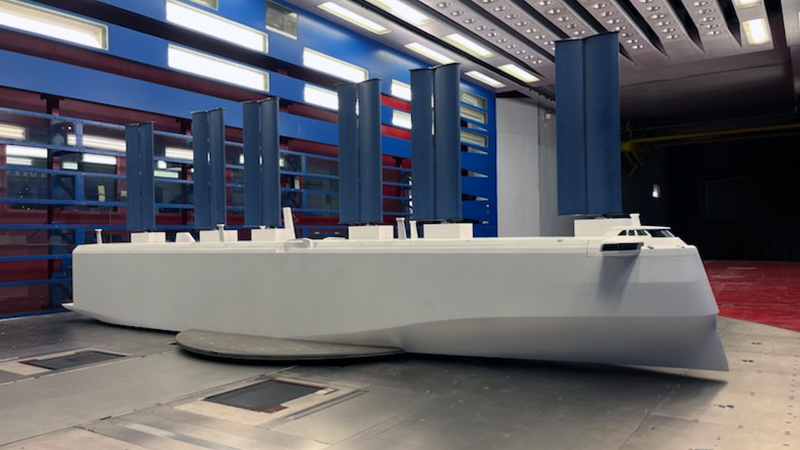Wallenius Marine conducts design tests for ‘world’s first’ wind-powered PCTC

Innovative Wind-Powered Ship Design Testing
Wallenius Marine, a Swedish company specializing in ship design and management, is making significant strides in sustainable shipping. The company has recently conducted a series of tests to validate the design of a wind-powered pure car and truck carrier (PCTC). This initiative aims to revolutionize the shipping industry by harnessing wind energy, reducing reliance on fossil fuels, and minimizing environmental impact. The tests were carried out in collaboration with KTH and Oceanbird in Gothenburg, marking a pivotal moment in the development of wind-powered vessels.
Unique Testing Methodology
The testing process involved a sophisticated approach to evaluate the aerodynamic performance of the ship. RISE Maritime Department, formerly known as SSPA, played a crucial role in this endeavor. They constructed a 5×2 meter model of the vessel, weighing 1.2 tons, to simulate real-world conditions in a wind tunnel. This model allows engineers to assess how the ship interacts with wind and how its design can be optimized for better performance.
Previous tests focused on wing sails alone, without considering the hull’s influence. However, Wallenius Marine’s current tests combine both elements, making this approach unique. The tests examine several critical factors, including the interaction between the vessel’s hull and six high-tech wing sails. Engineers are also investigating the optimal distance between the hull and the wings to maximize performance. Additionally, they are testing three different types of command bridges to determine their impact on the vessel’s overall efficiency.
Another vital aspect of the testing is understanding how “off-design conditions” can affect the ship’s operation. This includes scenarios where a wing sail is positioned incorrectly, which could hinder performance. The data collected from these tests will contribute to the development of advanced wing control systems, further enhancing the ship’s capabilities. As Carl Fagergren, Senior Project Manager at Wallenius Marine, stated, “We are currently at a central stage in the design process where we want to ensure that our design meets all technical and operational requirements before we finalize the tender design.”
Shipping CEOs join forces to accelerate the decarbonization of the global maritime transport
Future Steps and Live Testing
Looking ahead, Wallenius Marine plans to take the next significant step in 2025. During this year, the Oceanbird wing sail will be tested live aboard Wallenius Wilhelmsen’s vessel, Tiranna. This live testing will provide invaluable insights into the ship’s performance in real-world conditions. The results will help refine the design further and ensure that it meets all operational standards.
The successful implementation of wind-powered vessels could transform the shipping industry. By reducing carbon emissions and promoting sustainable practices, Wallenius Marine is at the forefront of this change. The company’s commitment to innovation and environmental responsibility is commendable. As the world increasingly focuses on sustainability, initiatives like these will play a crucial role in shaping the future of maritime transport.
In conclusion, Wallenius Marine’s testing of wind-powered PCTCs represents a significant advancement in ship design. The combination of innovative technology and rigorous testing methods sets the stage for a new era in sustainable shipping. As the industry evolves, the insights gained from these tests will be essential for developing efficient and environmentally friendly vessels.
